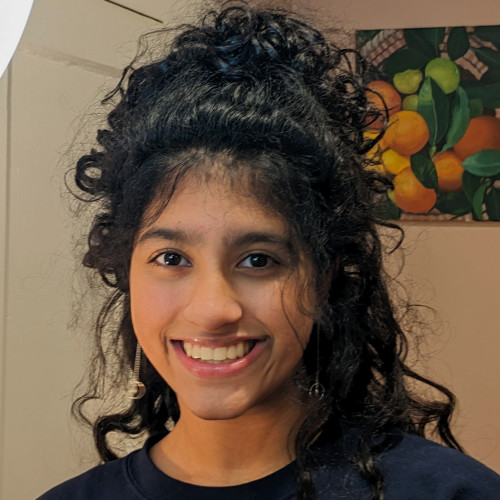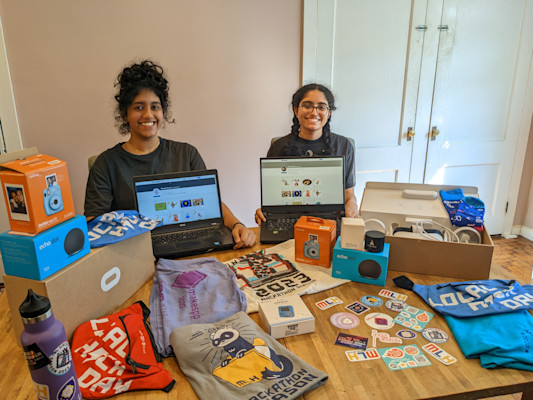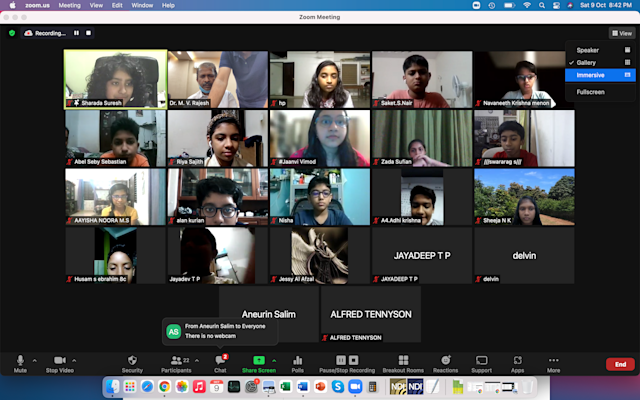Sharada Suresh

Since they were little, Sharada and her big sister Harita have had a knack for programming. When they first started learning on Code.org in elementary school, they were amazed by how their code could control video game characters. Soon after, Sharada and Harita registered for online programming courses by IBM and Georgia Tech, moving from Scratch to Python. When they reached junior high and found that their school didn’t have any computer science classes or clubs, they realized most of their peers didn’t have access to the same resources they had. Seeing major gaps in accessibility to technology, they dedicated themselves to doing something about it.
In 2020, Sharada and Harita founded Little Apple Academy, a nonprofit focused on teaching coding to students between the ages of 8 and 11. While they utilize Code.org lessons to get everyone on the same page, they were also inspired by their hackathon experience to create their own project-based curriculum for students.
During the height of the COVID-19 pandemic, Sharada and Harita found it was difficult to collaborate with their friends, and decided to register for MakeSPP 2020. The collaborative hackathon environment inspired them to attend their next hackathon, SheBuilds, a few months later. Their project, COVID Aware, was a vaccine-access app which helped people in Hudson County, New Jersey find vaccine providers during times of severe supply shortages. Not only was COVID Aware awarded 1st place by the judges, but it also inspired them to develop projects addressing other issues close to home. To date, Sharada and Harita have created 13 apps to address real-world issues like climate change, gender equality, and domestic violence. On their hackathon experiences, Sharada says, “we feel empowered when working on real-world issues and solving problems with technology. Hackathons have inspired us to put the power of coding into the hands of so many more people.”
Sharada and Harita have since submitted winning projects at 10 other hackathons, including RoboHacks 2, Hack-Cade 2, Lily Hacks, and Give Back Hacks. The projects they’ve created at hackathons have helped them build the foundation for the Little Apple Academy’s curriculum. Their project-based program includes everything from block coding to Python to web development. Sharada and Harita have even organized their own hackathon, Little Apple Hacks, to help reduce the gender gap in technology. Several of their students have already gone on to win hackathons themselves!
Sharada says she and her sister believe that “with equitable access to computer science, we can create a more equitable future for all.” They have already taught several rounds of classes with Little Apple Academy, reaching students of all backgrounds from 10+ countries. In collaboration with IEEE Kochi, IEEE Patna, and the Indian Institute of Technology, Sharada and Harita have shared resources with students in rural and underserved regions of India. Their Little Apple Academy students have written over 120,000 lines of code and created more than 450 Scratch projects. They have been recognized for their work with Little Apple Academy by PBS 13, NJ.com, and Code.org, and were also featured in The74’s 16 Under 16. They plan to continue their careers in computer science and to continue bridging gaps in equity wherever they can.


Sharada Suresh

Since they were little, Sharada and her big sister Harita have had a knack for programming. When they first started learning on Code.org in elementary school, they were amazed by how their code could control video game characters. Soon after, Sharada and Harita registered for online programming courses by IBM and Georgia Tech, moving from Scratch to Python. When they reached junior high and found that their school didn’t have any computer science classes or clubs, they realized most of their peers didn’t have access to the same resources they had. Seeing major gaps in accessibility to technology, they dedicated themselves to doing something about it.
In 2020, Sharada and Harita founded Little Apple Academy, a nonprofit focused on teaching coding to students between the ages of 8 and 11. While they utilize Code.org lessons to get everyone on the same page, they were also inspired by their hackathon experience to create their own project-based curriculum for students.
During the height of the COVID-19 pandemic, Sharada and Harita found it was difficult to collaborate with their friends, and decided to register for MakeSPP 2020. The collaborative hackathon environment inspired them to attend their next hackathon, SheBuilds, a few months later. Their project, COVID Aware, was a vaccine-access app which helped people in Hudson County, New Jersey find vaccine providers during times of severe supply shortages. Not only was COVID Aware awarded 1st place by the judges, but it also inspired them to develop projects addressing other issues close to home. To date, Sharada and Harita have created 13 apps to address real-world issues like climate change, gender equality, and domestic violence. On their hackathon experiences, Sharada says, “we feel empowered when working on real-world issues and solving problems with technology. Hackathons have inspired us to put the power of coding into the hands of so many more people.”
Sharada and Harita have since submitted winning projects at 10 other hackathons, including RoboHacks 2, Hack-Cade 2, Lily Hacks, and Give Back Hacks. The projects they’ve created at hackathons have helped them build the foundation for the Little Apple Academy’s curriculum. Their project-based program includes everything from block coding to Python to web development. Sharada and Harita have even organized their own hackathon, Little Apple Hacks, to help reduce the gender gap in technology. Several of their students have already gone on to win hackathons themselves!
Sharada says she and her sister believe that “with equitable access to computer science, we can create a more equitable future for all.” They have already taught several rounds of classes with Little Apple Academy, reaching students of all backgrounds from 10+ countries. In collaboration with IEEE Kochi, IEEE Patna, and the Indian Institute of Technology, Sharada and Harita have shared resources with students in rural and underserved regions of India. Their Little Apple Academy students have written over 120,000 lines of code and created more than 450 Scratch projects. They have been recognized for their work with Little Apple Academy by PBS 13, NJ.com, and Code.org, and were also featured in The74’s 16 Under 16. They plan to continue their careers in computer science and to continue bridging gaps in equity wherever they can.





